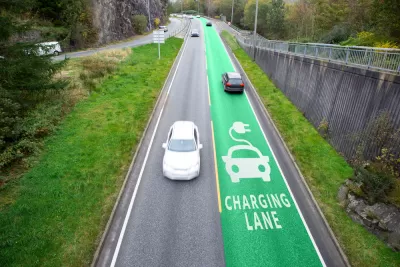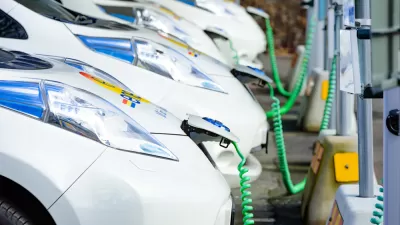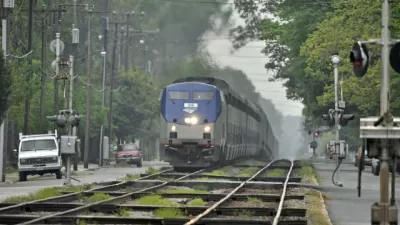The future of road infrastructure likely includes wireless electric charging, innovative construction materials, and more data collection. Will cities remember to prioritize pedestrian safety, too?

As technology becomes more and more embedded in transportation, Skip Descant, writing in Governing, investigates how road infrastructure might change to accommodate new technologies. With more vehicles requiring electric charging, “Converged and coordinated sectors like energy and transportation are the prerequisite to effectively growing the widescale adoption of EVs, experts say.”
According to Allie Kelly, executive director of The Ray, a ‘technology testbed’ in Georgia, “We can’t support electrified transportation without building at-scale EV charging hubs. And we can’t support functionality like platooning or functionality like Level 5 autonomy without building the digital and the physical infrastructure to support more connectivity, and to leverage data and transportation with connected and autonomous vehicles.”
To prepare for the future of transportation, “Energy, transportation and charging hubs are coming together in the form of initiatives like using roadway rights of way for the installation of solar fields to generate electric power.” Descant adds that some cities and states are experimenting with new road building materials, such as recycled car tires.
There are challenges on the regulatory side,too. Urban Movement Labs, a Los Angeles-based nonprofit transportation and urbanism think tank, “is working to develop an ‘integration manual’ to help cities understand the regulatory landscape, and other concerns, for systems like these.”
As the article points out, new technologies, such as delivery drones and robots and autonomous vehicles, are already proliferating. Meanwhile, pedestrian death rates keep growing. “For everything else we do, safety’s got to be an imperative. And we use this moment to advance safety,” said Mark Rosekind, former administrator with the National Highway Traffic Safety Administration (NHTSA) and chief safety innovation officer at mobility-as-a-service (MaaS) company Zoox. But while technology makes lofty promises for speed and efficiency, cities continue to lag behind on low-tech improvements that could reduce traffic deaths and limit the impact of human—and, in the future, autonomous vehicle—error behind the wheel.
FULL STORY: How Will Road Infrastructure Change In The Next 30 Years?

Planetizen Federal Action Tracker
A weekly monitor of how Trump’s orders and actions are impacting planners and planning in America.

Maui's Vacation Rental Debate Turns Ugly
Verbal attacks, misinformation campaigns and fistfights plague a high-stakes debate to convert thousands of vacation rentals into long-term housing.

Restaurant Patios Were a Pandemic Win — Why Were They so Hard to Keep?
Social distancing requirements and changes in travel patterns prompted cities to pilot new uses for street and sidewalk space. Then it got complicated.

In California Battle of Housing vs. Environment, Housing Just Won
A new state law significantly limits the power of CEQA, an environmental review law that served as a powerful tool for blocking new development.

Boulder Eliminates Parking Minimums Citywide
Officials estimate the cost of building a single underground parking space at up to $100,000.

Orange County, Florida Adopts Largest US “Sprawl Repair” Code
The ‘Orange Code’ seeks to rectify decades of sprawl-inducing, car-oriented development.
Urban Design for Planners 1: Software Tools
This six-course series explores essential urban design concepts using open source software and equips planners with the tools they need to participate fully in the urban design process.
Planning for Universal Design
Learn the tools for implementing Universal Design in planning regulations.
Heyer Gruel & Associates PA
JM Goldson LLC
Custer County Colorado
City of Camden Redevelopment Agency
City of Astoria
Transportation Research & Education Center (TREC) at Portland State University
Jefferson Parish Government
Camden Redevelopment Agency
City of Claremont





























